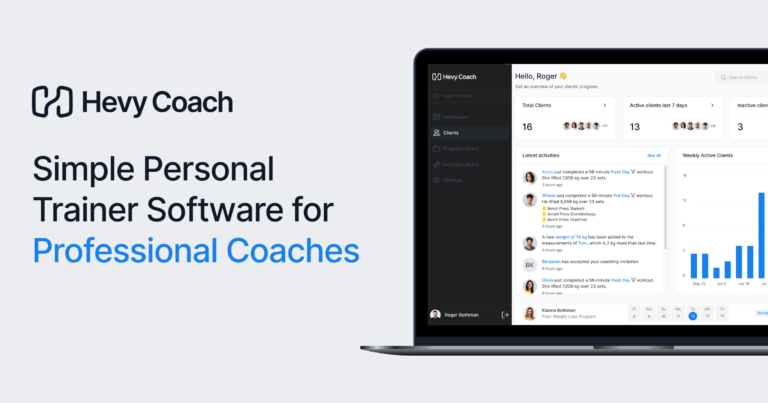Building a personal trainer business is exhilarating and challenging. On the one hand, everything is new, and you can’t help but daydream of the remarkable success you can enjoy. But, on the other hand, getting started takes time and a lot of effort.
One area where people struggle is deciding on a personal trainer business name. While seemingly straightforward, the task is more important than people imagine, and coming up with a good name can be a borderline infuriating experience.
To that end, we’ve put together this guide to outline everything you need to know when looking at potential training business names––from essential factors to consider, to the steps you should follow and everything in between.
So, stick around to learn what it takes to come up with several perfect personal trainer business names and how to narrow your choice to the clear winner.
Understanding the Importance of a Business Name
Your business name is more than a label or something you write down on company documents for taxing purposes. When done correctly, it becomes the cornerstone of your brand, bringing out certain emotions and thoughts in people.
What comes to mind when you think of brands like Apple, Nike, or Toyota? For many, Apple brings thoughts of sleek, beautiful, and efficient devices integrated into an intelligent eco-system; Nike represents athleticism and triumph, often tied to a famous athlete like LeBron James; and Toyota stands for reliability and durability––a vehicle you can trust to stand the test of time.
While these are extreme examples of iconic, multi-billion dollar brands, we can learn a lot. Nike, Toyota, and Apple have encapsulated their unique value proposition and essence into their names. As a result, these are not just names but symbols in their respective industries.
In the same way, a good personal training business name can become a symbol of good fitness guidance, lasting results, and other things your potential client might value.
Let’s dive a bit deeper into the significance of a good personal trainer business name:
- The foundation of your advertising and marketing – your business name is the starting point for almost all brand activities, from logo and website design to marketing campaigns. The right name can lead to a more recognizable brand, better return on investment (ROI) when advertising, and the ability to attract the right people.
- Reflecting your services and values – there is nothing worse than a mismatch between the name and services or products of a business. The proper name will quickly inform people who come across your brand what you’re about.
Take 24-Hour Fitness as an example. While a simple name cannot tell everything about a brand, it can instantly set it apart. In this case, the name immediately conveys convenience and accessibility, setting expectations for potential clients: “Oh cool, I can work out there whenever I want.”

Try Hevy Coach
Intuitive personal trainer software, with a world class experience for your clients.
30 day free trial, no credit card required
8 Factors to Consider When Choosing a Business Name
1. Relevance to the Industry
Relevance is crucial. When picking a personal training venture name, ensure it aligns with your target audience and their values. Relevant names increase the chance of instant recognition, which is becoming increasingly valuable as people’s attention span shortens.
Consider the name Pheasyque. While the word doesn’t mean anything, it resembles a common term in fitness and bodybuilding: physique. That name pulls the right people, getting them to check out the Instagram profile when it pops up in their feed.
Now, contrast that name to something like Blue Wave Enterprises. While it’s not a bad brand name, it’s not nearly as relevant because it doesn’t even hint at fitness or physical development.
A relevant name also positions your brand more favorably in the industry, ensuring people associate it with the right fitness niche. For example, Weight Loss Expert clearly states that the business focuses on helping people shed fat, whereas Hypertrophy Coach means that person helps clients build muscle.
Both are in the fitness industry but attract different people.
As mentioned above, a mismatch between the name and what the business offers is bad because it attracts the wrong people, sets false expectations, and leads to a negative experience.
In essence, think about the relevance of your business name. When brainstorming ideas, always circle back to the question, “Does this name reflect personal training and the specific services I offer?”
2. Uniqueness and How Memorable It Is
In today’s saturated fitness industry, finding a way to stand out is advantageous and necessary. A unique and catchy personal training business name will likely linger in people’s minds long after the first encounter.
Consider brand names that have left a mark in your memory. What makes them unforgettable? Chances are, it’s their uniqueness.
For example, GarageGymReviews clearly states what the business is about and is short and memorable. You might come across it on social media and not think twice. However, that brand could pop up in your mind the next time you want to buy gym equipment.
That said, uniqueness should never come at the expense of clarity. Cool-sounding names can be tempting, but the one you choose must be informative enough and align with your business. Random names can work and lead to wildly successful brands, but they can also confuse potential clients and be difficult to remember.
Consider the name and how it might look on a design element, such as a logo. Some names look great on a logo, allowing for creativity, whereas others don’t.
3. Simplicity and Ease of Writing It
People’s attention spans are fleeting, and information overload has been the norm for quite a while now, which means simplicity is critical. Using a straightforward and easily writable name makes it easier for people to look you up later.
Have you ever randomly thought about a brand, only to fail to find it because you couldn’t recall its name or type it correctly enough for Google to do its magic? Exactly––you don’t want that happening to your brand.
Fortunately, simplicity is often tied with memorability. For example, a brand name like FitLife is easy to recall, write down, look up, and recommend to others. In contrast, a name like ExerDynamix ProFit Solutions is not.
Furthermore, simple names are easier to pass around between people in the form of word-of-mouth referrals. Simplicity reduces the risk of miscommunication, allowing your business to grow organically.
Lastly, a simple name is fantastic for branding because it fits more seamlessly into logos and merchandise without feeling cluttered. That can save you plenty of headaches now and down the road.
4. Legal Considerations
Building a successful personal training business involves taking care of the mundane legal stuff to avoid unpleasant surprises down the road. When selecting your name, you must ensure it isn’t already taken and doesn’t infringe on an existing trademark.
The last thing you want is to get the ball rolling with your business only to find yourself slapped with a fine or lawsuit threats.

Here is a look at some of the things you need to be mindful of:
- Trademark – perform a trademark search before finalizing your business name to ensure your chosen name is available. A quick Google search for your training business name can reveal if there is already an existing brand, whereas using this tool can specifically tell you if a name is part of a trademark.
- Domain availability – you might not have plans to set up a website right away, but it’s always best to secure your preferred domain on day one to avoid potential problems down the road. Search for your personal trainer’s business name to see if a website uses it.
- Business registration – you will likely need to register your personal training business name with local or state authorities. Double-check to ensure your chosen name is available and not too similar to one already registered.
Given the complexities surrounding business law and intellectual property, it might be best to consult a professional. The fees you will have to pay would pale in comparison to headaches that could result from lawsuits or having to rebrand.
5. Target Audience Appeal
Successful businesses are those that understand their target audience and can present the best solutions to specific problems. For personal training, that means choosing a name that resonates with the people you want to serve––whether professional athletes, stay-at-home moms, older adults, or another group of people.
Begin by defining your target demographic with these questions:
- Who is your ideal client?
- What goals do they want to achieve?
- What struggles do they face?
- What are you good at?
- What problems can you help your clients solve?
- What do you want to be known for?
- Is there a demand for the type of service you want to provide?
Answering these and similar questions can help you pick better names and choose the one that best resonates with your target audience. For example, let’s say you want to work exclusively with older individuals. In such a case, your business name could be along the lines of Senior Fitness and Strength.
Alternatively, you may want to offer hybrid or online personal training services through a platform like Hevy Coach. In such a case, consider a name reflecting that.
6. Reflecting Your Business Values
Getting clear on core values and the aim of your venture can help you generate more relevant personal trainer business name ideas. Core values are the essence of what brands stand for and are crucial in building lasting relationships with clients.
Take some time to list core values that define your approach to coaching clients and running your business. Do you want to help people by creating holistic wellness plans, or are you more focused on specific outcomes: hypertrophy, strength, sports performance, etc.?
Or maybe your goal is to teach people sustainable fitness practices they can apply even when life gets chaotic and they barely have any free time.
Perhaps one of your core values is to help people build better habits and teach them to pay more attention to long-term changes over short-term gains.
Whatever it is, try to convey the right message when brainstorming trainer business name ideas. For example, a name like WholeLife Fitness could indicate a focus on various aspects of fitness, whereas something like EnduranceEdge Training could mean you focus on aerobic training and stamina.
That said, picking a name that reflects your values isn’t the end point but the beginning. You must then ensure that these values are present in every aspect of your business––from the marketing efforts and client interactions to how you coach people. Such consistency develops brand identity, strengthening your reputation in the industry.
7. Scalability and Future Growth
While it’s essential to focus on the here and now when naming your fitness business, you must also consider long-term goals and where you want to be five or even ten years later.
The right name would remain relevant as your business evolves, grows, and diversifies, reducing the risk of having to rebrand later.
Here are three quick tips:
- Don’t be too specific. A name like 10-Minute Yoga could be great because it’s specific and can attract the right people. However, it can also be limiting in the long run. What happens if you start offering a broader range of fitness classes or want to lead classes longer than ten minutes?
- Consider geographic limitations. Adding your location’s name to your business title might be a good option now. For example, why not use a name like Fitness and Strength in Seattle if you want to offer in-person training services in that city, right?
The problem is that you might later expand beyond your current location or decide to move. In such a case, you would have to change your name and inevitably set your business back. - Think about potential diversification. The fitness industry is dynamic, and we must be quick on our feet. This means the services we offer might change or evolve down the road. Consider more inclusive names that can account for potential diversification down the road.
8. Search Engine Optimization (SEO)
Search engine optimization (SEO) refers to improving or optimizing your website to boost its rankings on search engines like Google. In today’s digital age and high competition, good SEO is essential for improving your visibility and reaching more people organically.
The name you choose for your business can significantly impact your visibility on Google and people’s ability to find you online.
Here are a few things to keep in mind:
- Keywords – certain keywords like personal training, fit body, and weight loss are more popular and searched on Google. Incorporating these or similar terms in your personal fitness training business name can boost visibility.
- Competition – the more popular a term is, the greater the competition. Do your research for potential terms on Google to gauge the level of competition before deciding on a name. For instance, ‘fitness’ is a fantastic term to rank for, but the competition is fierce, and you’re likely to remain stuck on Google’s 100th page, never seeing any organic traffic to your website and social media profiles.
- Local SEO – if you aspire to build a personal training business and aren’t thinking about branching out in the future, you can incorporate location-based terms in your name––for example, Brooklyn Muscle and Strength or Lakeside Fitness.
That way, people interested in personal training in your area can more easily find you because the competition will likely be lower. - Specificity – short personal trainer business names are easier to remember, but there is such a thing as too short. Take the current rebranding of Twitter to X.com. Experts heavily criticize this decision, and one reason is that this can substantially impact SEO.
Your business name shouldn’t be too long, but it should be long enough to be distinctive and more easily recognizable, especially if brands with similar names pop up in the future.
Naming Your Personal Training Business: How to Get Started
Naming your personal training business can feel daunting, especially considering the numerous factors you should consider. However, as with most things, breaking the process down into individual steps makes it easier.
Here is a step-by-step guide to get started:
1. Find the Things That Set You Apart
The name of your personal training business should reflect your values, ideal customer, and how you can help people. Because of that, it’s important to start with the end in mind. Think about the business you want to have and consider what sets you apart from everyone else.
Who is your target audience? How can you help people? How would you conduct business?
Write these things on a piece of paper (or in a Word document) to use as a reference during the next step of the process.
2. Brainstorm Some Quick Ideas
Get a pen and a piece of paper and start writing down some ideas––good and bad, long and short. Don’t think too hard about it. The goal is to get your creativity going. Seek inspiration from existing brands if you struggle to get started.

Ideally, you should be able to write down at least 10-15 ideas before moving on to the next step.
3. Consider Word Associations
Now that you have a list of some ideas, consider which ones you can modify and which you should simply discard.
See if you can use some word associations for your existing ideas, and don’t be afraid to generate completely new ideas. Exploring associations allows you to craft the perfect name that brings out specific feelings or images in prospective clients, making your business more memorable.
For instance, let’s say your services revolve around raw strength training and power. In such a case, consider words like peak, strength, power, and fortitude. Or perhaps your services are more geared toward cardiovascular exercise and endurance. Words like endurance, running, and resilience could be a good fit.
Maybe your approach revolves around transformation and change, such as weight loss. You can use word associations like transform, evolve, or transcend.
4. Get Inspiration From Popular Keywords
Keyword tools like Ahrefs, SEMrush, and UberSuggest can provide valuable insight into people’s search habits, interests, and how they frame questions.
Some popular keywords that revolve around personal training and fitness can help you come up with good fitness content ideas for when your business comes to life and help you come up with a relevant and SEO-friendly name.
Start by using one of the above tools (or a similar one) to find popular keywords. Identify short keywords with decent search volume (at least 500-1,000 monthly searches globally) and write them down.
Identify some potential names that include these keywords, and see if you can change some of the names you’ve already come up with to include these search terms.
Search for keywords around the following terms:
- Fitness
- Strength
- Personal training
- Wellness
- Transformation
- Coaching
Exploring two and three-word search terms based on these will likely give you dozens of potential ideas.
It’s also essential to think about search intent. In other words, what is the person trying to find with that keyword, and what could that mean for your business? For example, if the keyword beginner home workouts is steadily growing in popularity, that could mean an opportunity for at-home personal training. If you decide to go down that route, potential business names could be:
- HomeFit Haven
- CasaCore Training
- LivingRoom Lifts
- HearthFit Hub
5. Simplify
“If I had more time, I would have written a shorter letter.”
Most people tend to add things to make something better. However, removing unnecessary elements and simplifying one’s message can be a powerful way to improve the end product.
At this point, you should have a decent list of potential training business names. The job is to prune the list by removing the names you’re sure you won’t use.
Once you’ve narrowed down the list, review all remaining names individually and consider simplifying them if possible. Maybe there is a word you can remove, or perhaps you can merge two words into one? Could there be an opportunity for some wordplay?
Challenge yourself to shorten all the remaining names without hindering the underlying message you’re trying to convey.
For instance:
- Peak Performance Training → Peak Fitness PT
- Beyond Limits Fitness Coaching → Beyond Limits Fitness
- Stride Strong Training Solutions → Stride Strong Training
- Fitness Foundation Training Performance → Fitness Foundation Training
These are not the best names, but you get the idea. There is almost always an opportunity to simplify and make your message clearer.
6. Double-Check
Finally, double-check to ensure your chosen name is available and a good fit for your business. First, consider the level of competition with a Google search. See how many other brands have a similar name. If the name is too common, perhaps consider another one to stand out more.
Second, if you use a keyword in your business name, ensure it is relatively popular and gets at least 500-1,000 monthly searches.
Finally, consider the legalities mentioned above. Double-check to ensure the name isn’t part of a trademark, see if the domain, preferably ending in a .com, is available, and make sure there aren’t firms with identical names when registering your business.
Think Beyond the Name
Coming up with the perfect fitness personal training business name is a significant first step, but it is just the beginning. You must then consider all the other important details around running a successful business like:
- What certification to get (and how much it will cost)
- How to start working with each new client and collect the relevant information
- What services will you offer
- What form of coaching would you like to offer (in-person, online, or hybrid)
- How to engage your clients and keep them motivated
- How to advertise yourself and bring in your first clients
For instance, Hevy Coach is a fantastic platform that streamlines the coaching experience, allowing trainers to track their clients, offer ongoing guidance, and build training programs in record time.
Should You Just Use Your Name?
Let’s say you have a catchy name and think it would sound far better than something like Fitness Boost Personal Trainer. Should you just add a ‘Fitness’ or ‘Training’ to your name and move from there, or would it be better to think more about your brand?
It’s worth noting that plenty of successful brands are named after their founder. Here are some examples:
- Ford – named after Henry Ford
- James Clear – the go-to person if you want to build better habits
- Walt Disney Company – named after Walt Disney
- Hewlett-Packard (HP) – founded by Bill Hewlett and Dave Packard
- Harley-Davidson – founded by William S. Harley and Arthur Davidson
- Martha Stewart Living – named after its founder, Martha Stewart
- Tracy Anderson – a fitness entrepreneur known for the Tracy Anderson Method
Plus, plenty of fitness influencers simply add a Fit, Fitness, Coaching, Personal Training, or similar term to their name and build from there.
The great thing about this approach is that you don’t have to spend nearly as much time brainstorming ideas, taking care of legalities, monitoring keywords, etc. Your name is likely free for a fitness brand and is likely distinctive enough to set you apart from the competition.
Plus, as your brand grows, your name can become a keyword on Google, bringing in hundreds or thousands of organic searches. For example, James Clear has become so popular that his name is a popular keyword on Google with thousands of monthly searches.
That said, while your name could be good for a personal trainer signature fitness brand, it can also be limiting. Here are a few potential drawbacks to be mindful of:
- If the brand ever faces scrutiny, it could be difficult for you to set yourself apart from it because you are seen as one entity
- A business named after one person could make it seem like just that person is running the business; that could affect the perception of size or scope, especially if you plan to expand later
- It would be more challenging to sell the brand later if you choose to move on to different things
- Even if the name includes a term like Fitness, it could be difficult to convey what the brand stands for and who it can help
Related article: How Much Do Fitness Influencers Make in 2024?
60 Engaging Personal Trainer Business Name Ideas

Weight Training
- Lift Master Studios
- Iron Pulse Gym
- Powerlift Pros
- Iron Crafters Fitness
- Bulk Builders Studio
- Lift Logic Training
- Iron Elite Workouts
- Power Plateau Fitness
- Steel Strength Studios
- Muscle Mint Gym
- Bulk Buddy Fitness
General Fitness
- Total Tone Training
- Body Balance Gym
- Prime Pulse Training
- All Round Radiance
- Peak Physique Studios
- Fitness Fusion Studio
- Body Bloom Training
- All Aspect Athletics
- Peak Pursuit Training
- Body Boost Gym
- Prime Peak Performance
- All Angle Athletics
Performance
- Elite Edge Training
- Peak Performer Gym
- Pro Pulse Studios
- Top Tier Training
- Performance Prime Gym
- Peak Pinnacle Training
- Performance Pulse Gym
- Elite Echelon Fitness
- Pro Peak Performance
- Top Tone Training
- Performance Pros Gym
- Peak Prowess Training
- Performance Pioneer Gym
Lifestyle
- Life Lift Studios
- Wellness Wave Gym
- Balance Buddy Training
- Wellness Wonders Gym
- Balance Boost Studios
- Wellness Warriors Fitness
- Balance Bloom Gym
- Wellness Wish Studios
- Balance Beacon Training
- Wellness Wander Gym
- Wellness Whisper Fitness
Sports
- Sport Sculpt Studios
- Athletic Aim Gym
- Sport Sense Training
- Athlete Aura Fitness
- Athletic Atlas Gym
- Sport Synergy Training
- Sport-Savvy Studios
- Athletic Ace Gym
- Sport Surge Training
- Athlete Apex Fitness
- Athlete Avenue Fitness
- Athletic Ascent Gym
- Athlete Arena Fitness
Examples of Successful Personal Training Business Names
Some names have stood the test of time, and the associated brands have become synonymous with fitness and wellness. Let’s look at a few examples and try to understand what makes them unique:
- Crunch Fitness. The name is catchy and easy to remember. It includes the word crunch, which most people associate with popular core exercises like crunches and sit-ups.
- Anytime Fitness. The name brilliantly communicates this brand’s selling point: accessibility. It draws potential clients with the promise of being able to work out whenever it’s most convenient for them.
- 24-Hour Fitness. This name is similar to the previous one, suggesting that clients can work out late in the evening, early in the morning, or even at 3 AM if that fits their schedule.
- CrossFit. While most people consider CrossFit a specific training modality (which isn’t incorrect), it is actually a brand name that’s evolved and become incredibly popular.
- Precision Personal Training. The name communicates attention to detail and clear guidance for people seeking personal training services.
- Fitness Together. A brand that offers private and semi-private personal training, emphasizing support and guidance to attract clients.
- GymGuyz. The brand comes with a simple promise––to bring the workout to you and offer at-home personal training services.
- Fit4Mom. The business helps mothers get fit through tailored exercise classes, personal training sessions, and pre and postnatal fitness guidance. The name is clear, specific, and memorable.
Here are a few things that make these brand names popular, memorable, and successful:
- Clear communication. Each of these names communicates the core of the business.
- Memorability. Each of these names is short and easy to spell, which makes them more memorable and easy to look up later.
- Adaptability. Each name is broad enough to encompass multiple things or leave room for future expansion.
Are Business Name Generators Worth it?
Business name generators have emerged as a possible solution for people struggling to come up with a good name for their business. The question is, should you use one?
These tools automatically generate names based on some basic input from the user––for example, write a keyword like fitness and see what the tool comes up with. These tools typically include the keyword in the name or leverage their algorithm to develop a catchy title.
Pros of a generator:
- Quick and efficiently come up with names
- Get inspiration for a name if you’re stuck
- Enjoy a variety of ideas
- Many of these tools check domain availability when suggesting names
Cons of a generator:
- The ideas might not be that original
- There is a lack of a personal touch
- You might have to go through lots of irrelevant names
So, while business name generators can be helpful, these ideas should mostly serve as a starting point––for example, to get your creativity going. Don’t solely rely on them for your business name because they will likely lack originality and a personal touch.
Conclusion
Coming up with personal training business names can be a long and frustrating process because there are multiple things to consider, including:
- Adding a personal touch
- Communicating who you can help
- Making sure the name is available
- Coming up with a simple and memorable name
Fortunately, the process gets easier when you break it down:
- Determine what sets you apart from others.
- Consider who your ideal client is.
- Brainstorm some quick ideas.
- Play around with word associations.
- Get inspiration from popular keywords.
- Simplify.
- Double-check to ensure everything is in order.
Beyond your business name, you must also spend a fair amount of time optimizing your coaching practices to boost client satisfaction and retention.
To that end, we highly recommend checking out Hevy Coach––the all-in-one platform for trainers and their clients. Construct workouts in minutes, assign them to clients, and make changes when necessary. The platform makes it easy to track your clients’ activity and keep them accountable.
FAQs
1. How do I name my personal training business?
Consider what makes you unique, think about your ideal customer, and brainstorm ideas to convey that message. Aim for simple, memorable, and easy-to-spell names.
2. Should I use a business name generator?
You can use it, but only as inspiration. Add your personal touch to set yourself apart from your competition.
3. What are the legal considerations when naming my business?
Check if the name is trademarked, if there are businesses with identical names, and if the associated domain is free.




